
Topics
20-year veteran of Iraqi journalism Nermin Al-Mufti joins us in our firehouse studios. She recently arrived in the U.S. from Baghdad to kick off a nationwide tour hosted by major universities, municipalities, cultural and humanitarian organizations. [includes transcript]
Two more U.S. soldiers have died in Iraq after their tank was hit by an explosive. The New York Times reports that the attack marked the first time an M1 Abrams battle tank was destroyed by Iraqi resistance fighters since major combat operations ended.
In Baghdad, the U.S. military announced that the U.S.-appointed deputy mayor of Baghdad Faris Abdul Razzaq Assam had been assassinated on Sunday. He had been repeatedly warned that his life was in danger if he continued to collaborate with the U.S. occupying forces.
- Nermin Al-Mufti, 20-year veteran of Iraqi journalism. She recently arrived in the U.S. from Baghdad. She is kicking off a nationwide tour hosted by major universities, municipalities, cultural and humanitarian organizations across the country.
AMY GOODMAN: We’re joined on the phone by Robert Fisk of “The Independent” newspaper and joined in our studio by a woman who has just arrived in the United States. Her name is Narmin Al Mufti. She is a reporter for more than 20 years in Baghdad. Welcome to democracy now!.
NARMIN AL MUFTI: Thank you.
AMY GOODMAN: It’s very good to have you with us. We have just gotten — First let me ask your response to the news conference that you just heard, the question of whether the mission has been accomplished, according to President Bush.
NARMIN AL MUFTI: We are still in war in Baghdad, for — not only in Baghdad, in all Iraq, for many reasons. First, the reconstruction didnít begin ëtil now, weíre still now — especially in my home because my apartment is in front of a major central exchange in Baghdad. Allah-Week exchange, so, until now, every morning I open my eyes with that great, huge of demonstrations and black smoke. So, through that bombardment, everything is destroyed tells us war is not finished. The second, President Bush, as yesterday, he said since May 1, they began another war. This time I was saying it to American friends that President Bush or any American… The administration, they have a council with many, many parts in the whole world, so they are settling their accounts now with the others in Iraq. He said ones now would begin our war against terrorism and Iraq is the first gate towards that war. So, as they finished the so-called revolution in Iraq, they want to liberate the whole world.
AMY GOODMAN: Can you tell us about Farez Azaq Assam, the U.S.-appointed deputy mayor of Baghdad who was assassinated on Sunday? Did you know him?
NARMIN AL MUFTI: He was my friend. Yesterday, I was astonished. He was just coming back from a meeting with the Americans… He was my friend. He’s the same age as mine. He has two kids. His wife a psychiatrist.
AMY GOODMAN: Who do you think killed him?
NARMIN AL MUFTI: I don’t know. Once, you know, I was the — You know, when they —- when cabinet-council or somebody from the cabinet— council insisted to be back at the case, the Iraqi society, of course… Still the Baíathists were very noble. Farez was one of them. He was very noble. He was Baíathist, but he was very noble. But he was one of the — You know we have now in Baghdad, about 170 papers. One of the papers just two weeks ago put about 14 names of ex-Baíathists who are working in Baghdad, Baghdad mayors. Mayoralty. They put them in, saying that they are Baíathists. They are criminals. They should be killed. So, one of them and the others, they are — Again, it is a matter of account.
AMY GOODMAN: We wake up every morning and we hear about more U.S. soldiersí dying. We hear about bombings of the Red Cross or police stations and I think everyone winces every time they hear about a casualty. Now thereís a new report out from the Massachusetts-based project on defense alternatives that estimates up to 15,000 Iraqis were killed in the opening days of the U.S. invasion. Not even talking about now. I think if people heard, no matter who was dying, what the real casualties were every day, they would also wince in terms of Iraqis, too. What is your sense? Does that number surprise you? Thatís just the first few days. I want to put that question to Robert Fisk, too. 15,000 people in the first few days. When we hear that a U.S. soldier has died, what is your estimate of how many Iraqis are dying a day now?
ROBERT FISK: Well, I noticed in the “New York Times,” about four weeks ago, that it referred to ìthe terrible toll of death during the summerî and it was only in paragraph three or four or five that I realized that it was referring to 76 Americans, not to the thousands of Iraqis, who died. I think there are two points here. 15,000 might be a bit high. I have to be honest and say of civilian deaths, I could believe 3,000 and at least the same or perhaps the same again for — In other words, twice that for soldiers, which means we’re talking of 9,000, which is still a huge figure but 15,000, unless it is very specific and documented, I think it sounds a bit high, to be honest. Nothing surprises me at the Middle East at the moment, especially with the Pentagon wheel of fortune, but that does sounds a bit high. What we’re not looking at, however, is the daily deaths of Iraqis, not just the 34 or 33 who were killed two days ago in the bombings or the six yesterday in Fallujah, but the thousands who have been killed in revenge-shootings, in robberies, in looting, at American checkpoints by American troops since April 9. I mean, I was last in Iraq doing a three-day investigation at the mortuaries every morning and I was looking at dozens of corpses of Iraqis brought in with gunshot wounds and these people are dying because there is no law and order and no security in Iraq and their families are distraught. One man came into the city morgue next to me, bringing the body of a young Shiite man, not a Suni, but a Shiite, who had been shot in the street. They didn’t know the reason, they said, and they said, “You know, the Americans offered us such promises. We loved those promises and we waited for them and now we want to explode ourselves against them.” This was a very angry young man and I didn’t do a physical shut up, but I put three very sharp marks with my Barrow on the edge of my notebook, which I actually scored the paper and then wrote “watch out” in the margin. We are not taking into account the nightly death toll and then the woundings. They come in in the afternoon for some reason to the hospitals and it is very significant that a recent ruling by the so-called coalition provisional authority, with which the occupation-authorities dress themselves up as, that journalists could no longer visit hospitals without permission from the C.P.A., from the occupational Authorities, but we do get in, you know, bribes, you know, getting in a side door or whatever but the intention is obviously to prevent us learning of this death-toll and the real issue I think now is that we don’t record Iraqi deaths. We don’t care about them. You know, we, by our occupation — I’m saying “our” because I’m a Briton. Weíve got 20,000 or so troops there — by our occupation, we are required to care about Iraqis and their lives and deaths and we don’t. We don’t list their deaths. When the C.P.A. holds their repulsive press conferences with their constant propaganda-refrain of terrorism, terrorism, terrorism, they never give a list and they say they don’t even know how many Iraqis —
AMY GOODMAN: Well, let’s put that question to Narmin Al Mufti of the number of casualties, now, of Iraqis.
NARMIN AL MUFTI: I mean, nobody knows that, again, because they — once Apiq tried to know the casualties and they went to ñ not ñ to the whole of Turk, in the war, all over Iraq, but they found about ten or twelve hospitals and they found about twelve thousand in the beginning of the war but now I made my own investigation last July and I found that, in Baghdad only, we have 470 were shot and we compare it with the same July — The same month in twenty ñ uh, 2002, they were only 10 and this July, 2003, there were 470 just shooting, by shooting and, you know, there are others and we have another kind. I don’t know if it is a crime or not, but we have so-called between Iraqis, “Iraqi killed by friendly fire.” Every day we have them. Baghdad, everywhere in Iraq, about two, three Iraqis are being killed by ìfriendly fireî — American fires.
AMY GOODMAN: Hmm.
NARMIN AL MUFTI: I don’t know why there is. You know the Americans — they are very afraid. They are worried about their lives in a very terrible way, so, they couldn’t even say, stop, to that car. If the call to car to stop for any reason, they shoot ñ they shoot them —- and after they are shooting them, you couldnít find their bodies. Uncle and one of my friend’s uncle and wife and two sons were killed in July 20 and after sixty— three days of demanding and after killing there, they couldnt get their bodies back.
AMY GOODMAN: Narmin, you played an interesting role in Iraq: On the one hand, you were a journalist for Saddam Hussein’s party-newspaper, the Baath party newspaper for many years. You also worked for CNN. No?
NARMIN AL MUFTI: No.
AMY GOODMAN: But you also worked for CNN and I was just wondering, which was accused by Baghdad of being state media? So, it was an interesting contrasting role. Would you agree with that characterization or what would you say?
NARMIN AL MUFTI: It don’t imagine the movement of Saddam Hussein. Doesnít make sense it was media and I was —
AMY GOODMAN: It wasn’t media?
NARMIN AL MUFTI: It wasn’t media. It was just _____ One thing is the force. You donít know which way with that but still I had for last fifteen years, a weekly column. It’s called Shí-sak an say. It means “troublemakers” and I have trouble to attend the once… for one year, again for six months, they stopped me from writing but still, I could manage it. What happened in Baghdad under Saddam Hussein, you know, there was an amount — Maybe this is one of the previous regime’s force… You know, they — we are just after —- those saying good works for them, not nothing bad for them so they used to give an amount of money for them, so this was -—- There is no force in Iraq. Regime is excellent. The president is excellent. So, there is no force but this was one of the ways that lead us to this occupation and I, still, I was a lecturer at the College of Media for also 10 years. I think I was that media and now I’m speaking for CNN and in Iraq now we also have this media. We have about 176 papers weekly and daily. But you find nothing in it. Nearly almost 99% of them are rubbish. Really you canít find nothing in it. Beyond, if you there is democracy, democracy is rubbish so we can bear it. But there is nothing.
AMY GOODMAN: The U.S. authorities have closed down some papers when they didn’t like what they were saying. What kind of effect has that had?
NARMIN AL MUFTI: Again, you remember, min-, the — occupation or the C.P.A. — the coalition authorities, most of them are Americans, so they are there writing American Constitution, itself, not only the international conventions and laws ñ you know, under the presentment of the American Constitution, 1920, I think, thereís an article saying that the freedom of expression and freedom of medium-press is the whole thing but it isnít the whole thing in Iraq. They diverted a paper called Musta Qalyafa, the independent. They are all independent in it. They were _________ but they put the name of those — One of the Sheikh of one of the mosques in Fallujah said there is — Iraqis are preventing the occupation, they are just as bad, so we are going to kill them. They put that thing in their paper on the second page and they were killed and diverted and they took their papers, their computers, their filaments and to Iraqis, that means about $400, $500 only. They took it and then the education chief is still in jail for more than 75 years — days.
Saying that they are trying to arrive the feelings of the Iraqis against the occupation, so you couldn’t say anything in the paper against Bremer, against the occupation.
AMY GOODMAN: Are you writing now?
NARMIN AL MUFTI: No, no, I refuse to write in any Iraqi paper for that because at the beginning, I was against Saddam Hussein, but I couldn’t again ñ because Saddam Hussein became [inaudible], became history. Why ñ they are reading that history, day after day now. Even they are making There are human rights, so I discovered that what is happening from violation of human rights now in Iraq that it is about violation of human rights in that occupied for that I refuse to write.
AMY GOODMAN: Your sense of those who are opposing — resisting the occupation of who they are, Bush saying that these are the remnants of Saddam Hussein’s people, forces.
NARMIN AL MUFTI: No, they are genuine resistance, legitimate resistance. Fallujah, Saddam used to execute or to to kill 10 or 12 from them every year or every month. One of those heroes of Iraq, heroes of the last decade is Mohammad Magumah of Fallujah. He was killed by Saddam in a very brutal way, so all I’m… You know, mabe — Fallujah’s not among the Sunni triangle. More than half of the Fallujah are Shiia.
AMY GOODMAN: Were you saying they are opposed to Saddam?
NARMIN AL MUFTI: No. Yes, they are opposed to Saddam. It is —
AMY GOODMAN: And do they like the occupation now?
NARMIN AL MUFTI: It is genuine Iraqi resistance but just to break the circumstance, they are saying this is pro-Saddam’s force, Saddam’s followers. It is a genuine Iraqi resistance there.
AMY GOODMAN: What do you think would happen in Iraq if the U.S. forces were simply to pull out?
NARMIN AL MUFTI: So always I’m asked this question. If the American forces pull out without the biggest of the opposition or camp in Baghdad on the tanks, both of the American tanks, it will be terrible. If they want to pull out, they should take with them all those FIF Iraqi forces with them. They have around a thousand. And those figures of Iraqi positions are commanders of cabinet council. They are the best looking in Iraq. One of them is Akmed Chalabi, geds.
AMY GOODMAN: Akmed Chalabi.
NARMIN AL MUFTI: He said, here in the States, He made an American impression through false information and data, so all bomb-sheóI am going to say not ____ but if — I think maybe one day Americans can do honorable thing, say they can pull out with those with them, we can manage ourselves. We can ___ enough.
AMY GOODMAN: Robert Fisk, what is your sense of that?
ROBERT FISK: Well, I’d have to say that I think Nasim is a little bit too hard on the Iraqi newspapers that exist. She know — Quite a lot of the Iraqi papers in the streets of Baghdad are actually attacking the occupation forces. There have been some truly pathetic attempts by the Americans to intimidate Iraqi journalists but by and large, there is a good deal of reality coming over in the press and if I compare it to the papers I used to read in Baghdad under Saddam’s regime, and this is no offense to Nasim, itís a much freer press in our sense of the world. What is particularly disturbing Is the way in which the Americans are trying, obviously, to close down the Aba Ida and Al Jazeera satellite channels. They’ve been falsely accusing Al Jazeera of having advance-information of what they call, quote, terrorist attacks, unquote, simply because Al Jazeera are sharing pictures of wounded Iraqis, in many cases wounded by Americans. Just as Paul Wolfowitz, who claims he loves democracy, was prepared to ask the Turks why the army didn’t intervene to influence parliament when the Americans wanted to put troops into Iraq, so itís interesting to see the way in which Paul Bremer widely uses his claim of “incitement to violence” against any newspaper that criticized the occupational authorities and — but I noticed that Al Jazeera, a few weeks ago and, this, of course, was not reported in the United States, was actually summoned to the former presidential palace by Bremer’s State department man whose name is I think, Nabil Qori, probably of Lebanese origin, where they were handed a letter, saying, ìHave you assisted terrorists?î ìHave you paid money to terrorists?î ìDo you have advanced knowledge of terrorist attacks?î — etc., which Al Jazeera previously claimed, by all the, you know, the gods of commentators in the United States, from Colin Powell to Tom Friedman, as being, you know, a sign of democracy in the Arab world. Al Jazeera was supposed to be browbeaten by this nonsense. That is where the danger comes but I have to say, and I repeat that I think Nasim is exaggerating the 99% garbage of the Iraqi press. I don’t think itís that bad at all. I think the Iraqi press actually could be something very powerful if they concentrated. What the Iraqi press need, actually, is not Bremer’s fly swat or, indeed, Nasimís criticism. What they need is a school of journalism but unfortunately they don’t have one and Iraqi journalists, who are not used to living in an open society, are writing stories which is, frankly, in many cases are not true and which are provably untrue, which I have followed up and found to be untrue. I have to say this, in fairness, as a mainstream reporter, as well as being a great critic of Mr. Bush and the lies of the Bush administration, I don’t think the situation is quite as Nasim says but, of course, there are elements of truth in it, thereís no doubt.
AMY GOODMAN: Well, we have to leave it there but I’ll give you a 30 second response, Narmin.
NARMIN AL MUFTI: Robert, my name is NERMIN.
ROBERT FISK: very clear sense. Forgive me.
NARMIN AL MUFTI: And, second, yes, I’m Iraqi and I know those who are writing now in that paper. I’m insist, 99% is rubbish. For one important thing, they began themselves, theyíre carried again, theyíre pro-Saddams, all of a sudden, without one day, they converted against anti-Saddam. They began their new carrier by putting legends, not true stories about Saddam Hussein. One of them, Noman Hakhar, for now six months they have been putting every week a new meeting in —-——- with one of the Saddamís wife and that the ____ is now in Iraq. [inaudible]. So, they are rubbish because they began their ____ with very false and lies and they are doing the same thing. Maybe sometime and on and off if you can find something against the occupation but they say that there, Sabbakh and the others, they didn’t say that. They have been against the occupation.
AMY GOODMAN: Well, on that note, weíre going to have to leave it.

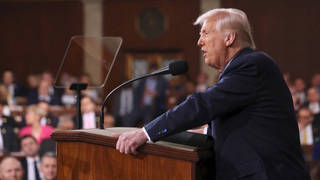
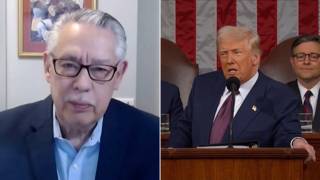
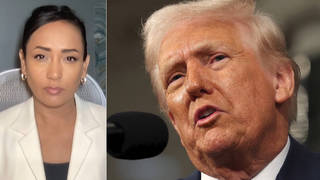
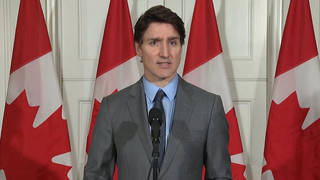





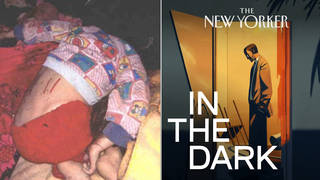
Media Options